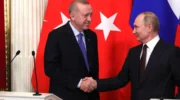US and European governments have been putting pressure on Israel to delay its ground invasion of Gaza to buy time for secret talks underway via Qatar to win the release of hostages held by Hamas, according to people familiar with the efforts.
The negotiations with Hamas, designated as terrorists by the US and European Union, are delicate and may fail, said the people, who asked for anonymity to discuss matters that aren’t public. But they said there are signs the group might agree to release at least some of the civilians its fighters captured in the deadly Oct. 7 raid go without demanding Israel release any prisoners in return. The US said late Friday that two American women had been freed.
After initially resisting a delay in what officials said would be a massive military operation to eradicate Hamas after the attack, Israel agreed under US pressure to hold off, the people said. Publicly, Israel has shifted its tone on plans for the operation in recent days, suggesting a more limited approach that may reduce civilian casualties.
Hamas took more than 200 people hostage in the Oct. 7 attack, which killed more than 1,400. They are being held in Gaza, where Israeli airstrikes and a blockade on supplies have fueled a humanitarian crisis. More than 20 of the hostages are teenagers and young children, while 10 to 20 of them are more than 60 years old, Israel’s military said Friday. They include dozens of citizens of the US, UK, France and other countries.
White House spokespeople declined to comment, as did Israel’s government. On Oct. 16, Hamas’s armed wing said non-Israeli hostages would be released “when circumstances on the ground allow.”
Late Friday, Hamas said it had released a woman and her daughter, both US citizens, “in response to Qatari efforts.” Israel and the US later confirmed the two had been freed.
“We have been working around-the-clock to free American citizens who were taken hostage by Hamas, and we have not ceased our efforts to secure the release of those who are still being held,” US President Joe Biden said in a statement, thanking Qatar and Israel for their “partnership in this work.”
Qatar’s Foreign Ministry said it would ”continue our dialogue with both the Israelis and Hamas, and we hope these efforts will lead to the release of all civilian hostages from every nationality.”
The US and its allies have sent a parade of leaders and top officials to Tel Aviv since the attack to voice support but also to warn the government of Prime Minister Benjamin Netanyahu of the need to allow humanitarian aid into Gaza and contain civilian losses in an invasion.
US and other officials fear that a brutal assault could further inflame tensions in the region, with Iran-backed groups in Lebanon and elsewhere joining in what would become a much larger war that could force the US to intervene militarily to back Israel.
Netanyahu’s government has said it will strive to release the hostages but also is resolved to eradicate Hamas from Gaza, where the group has ruled for almost two decades, building a network of tunnels and other emplacements.
Friday, Israel’s defense minister, Yoav Gallant, said the next phase of the Gaza operation would include “maneuvering, with the objective of neutralizing terrorists and destroying Hamas infrastructure,” warning that it could take time. Surprised by the Oct. 7 attack, Israel has been gathering the forces needed for the next phase of the operation, mobilizing more than 300,000 reservists.








